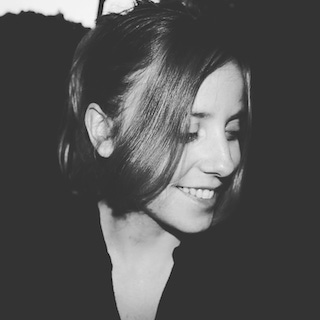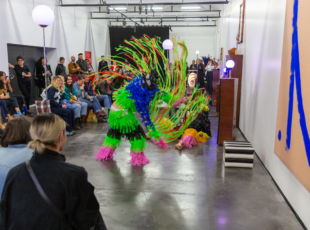Sandra Van de Kamp and Vakah Profana, drag queens unique in their genre
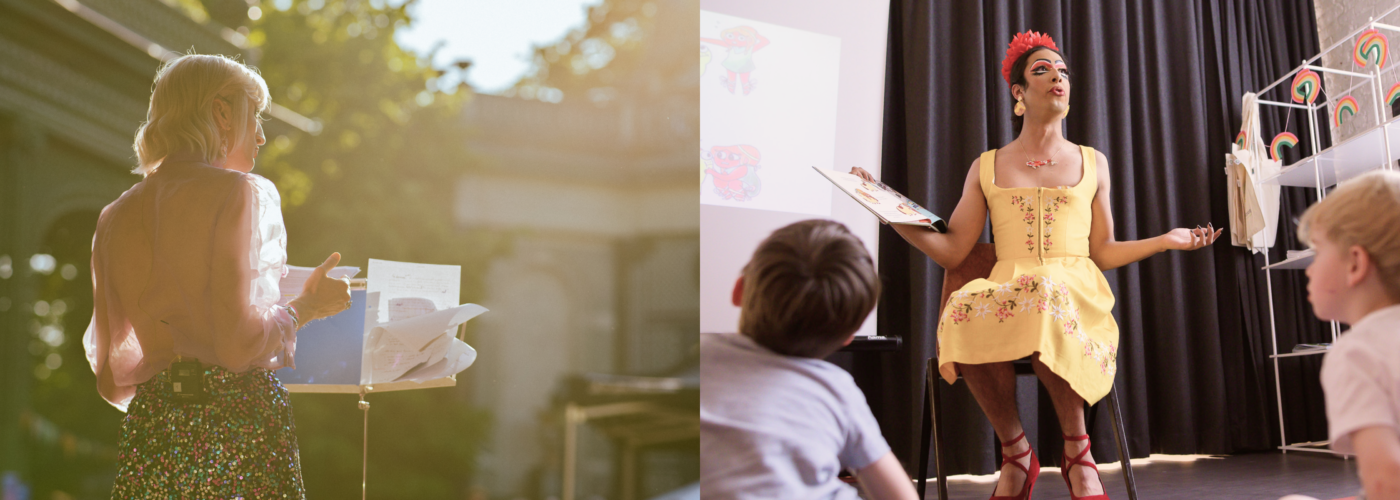
Article author :
To celebrate difference and shatter the silence through literature, poetry, words and colours… This is the goal of the Unique en son genre project, in which both Vakah and Sandra are involved. These two characters, a gentle mix of the sublime and the burlesque, are the alter-egos of artists Guillaume and André who, on the terrace of a Brussels café, told me their story. Prepare to be inspired…
First, meet Sandra van de Kamp. An announcer by training, Sandra is a funny and zany, eloquent and engaged stay-at-home mum, decked out like a kitsch 1980s pop star. Next, Vakah Profana. Some claim that, like Amanda Lear, this mysterious creature with a bewitching voice has her origins in the north-west of Brazil. An actor performing in telenovelas, an Amazonian singer, a sorceress or a cow reincarnated as a human being: the theories concerning her roots are legion. For over a year now, Sandra and Vakah have been travelling back and forth across French-Speaking Belgium to give readings, alongside six other drag artists, in schools, youth centres and cultural venues, as part of the ‘Unique en son genre’ project, which describes itself as: ‘A drag queen, a drag king, a book, an attentive child and an adult alongside them. Together.’
The text is always the trigger leading to discussion. We want the young people to react, ask questions amongst themselves to see what emerges from the themes we touch upon
Vakah
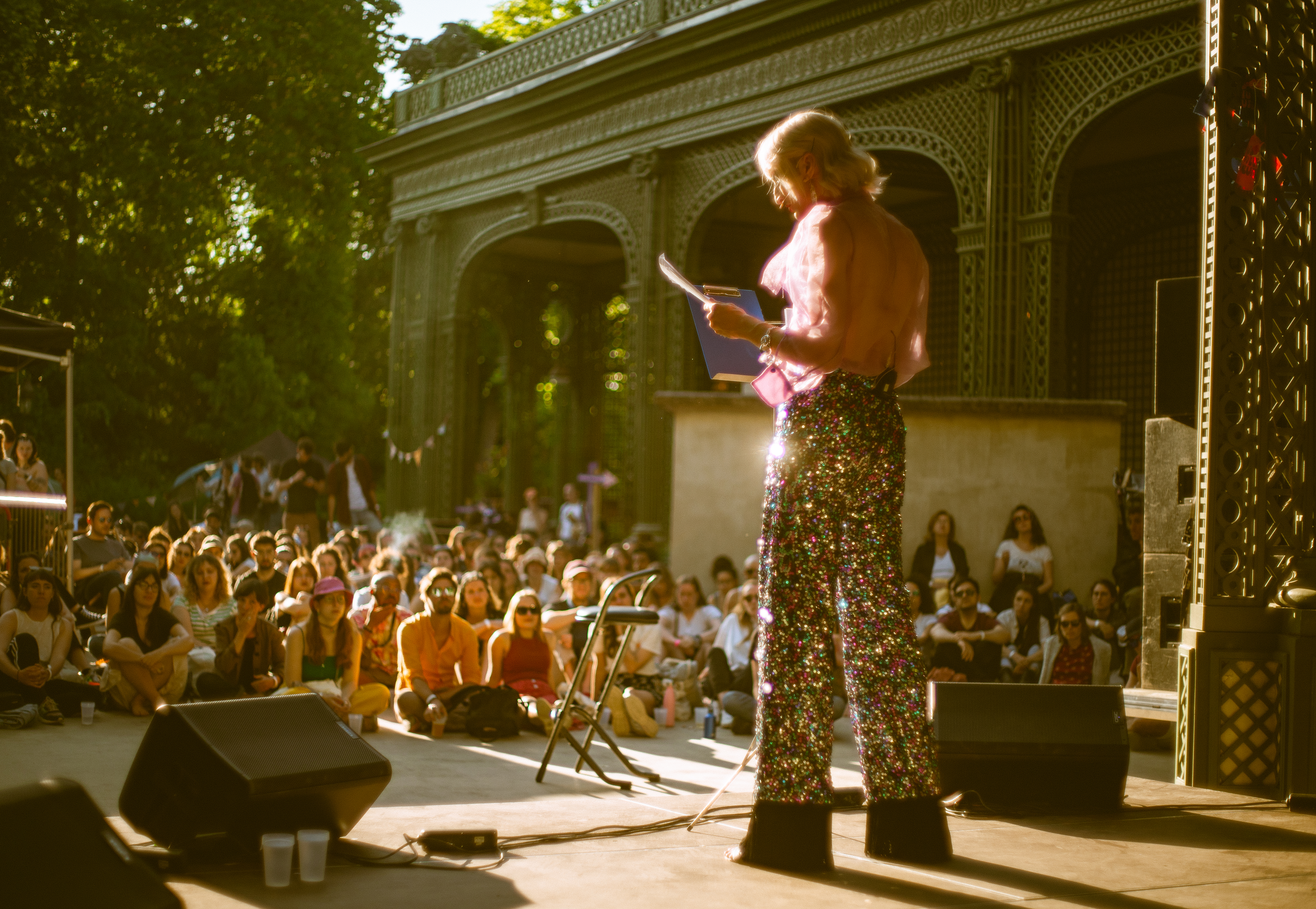
Opening minds through reading
Created in 2018 at the Théâtre de Liège, the concept is inspired by the Drag Queen Story Hour, which emerged in San Francisco in 2015, and the story hours which have been taking place in Quebec since 2016, organised by the drag queen Bardaba. Inclusive stories, letters, personal testimonies, poems and forums: the tales are adapted to the spectrum of ages (from 3 to 12 years), and question gender stereotypes, explore parental relationships, address different forms of discrimination, including those to which LGBTQIA+ people are subject, and give free rein to the imagination and curiosity – all within a caring space, devoid of any judgement. ‘The text is always the trigger leading to discussion. We want the young people to react, ask questions amongst themselves to see what emerges from the themes we touch upon,’ explains Vakah. These readings invariably give rise to unique and sometimes heartwarming moments, such as the time when, ‘at the end of one session, the children decided to have a group hug’. At other times, they elicit more personal confessions or unexpected reactions, such as the question a teenager asked one day: ‘What’s your agenda here?’ ‘We don’t have one,’ replied Vakah, other than sharing a moment of ‘kindness, tenderness and pleasure.’
Creatures steeped in the real
Sandra and Vakah are both stage characters, born of the imaginations and personal experiences of Guillaume and André. ‘Sandra is not someone who is the complete opposite of me. Basically, she is Guillaume wearing his superhero costume.’ André concurs: ‘Vakah is an exaggerated version of myself. I took aspects from my own biography which I interpreted in the form of mythology and mysticism.’
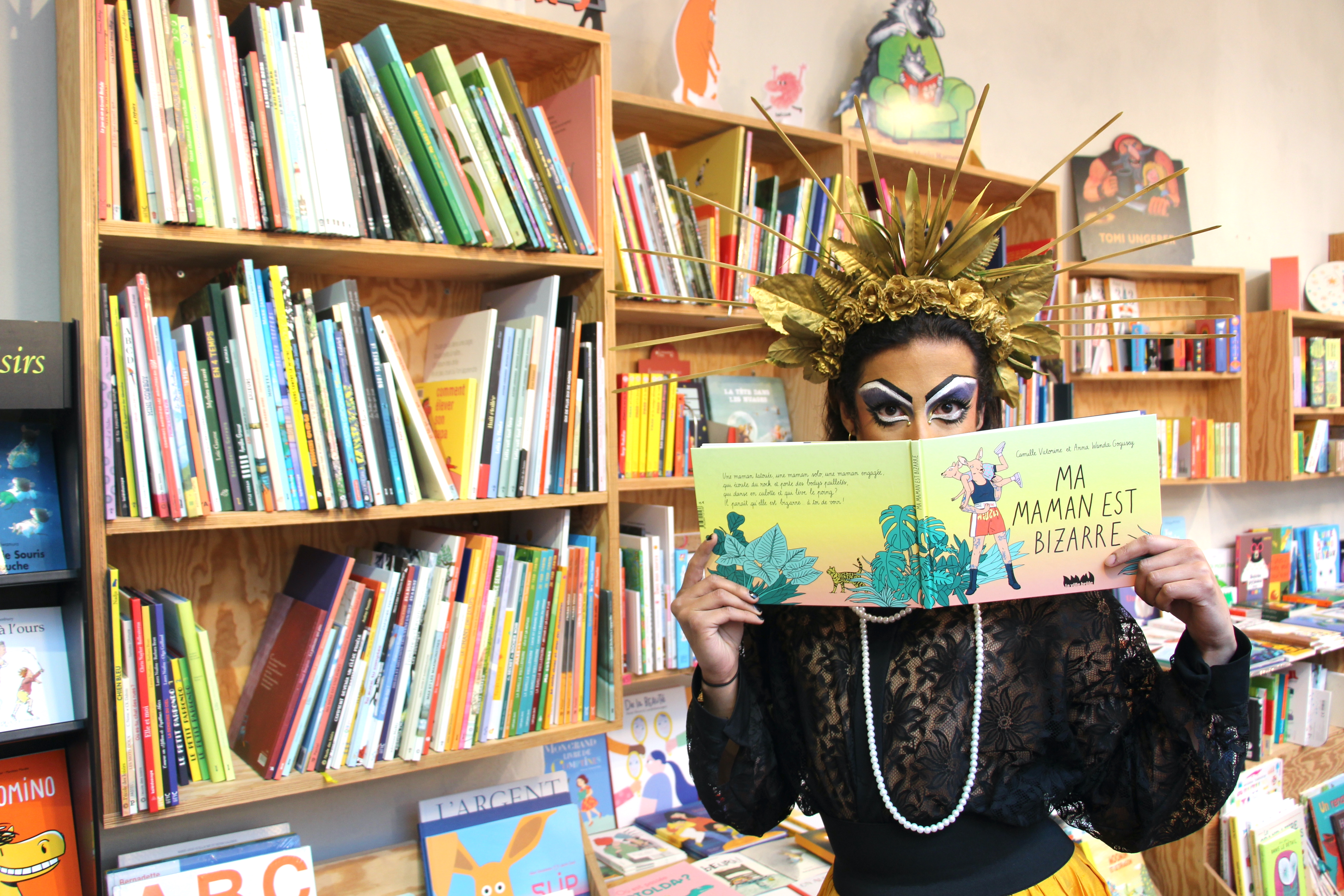
Born in Brazil, André moved to Italy at the age of 10, where he grew up in a loving family, in a devout and traditional environment. When he was 16, he became aware of his sexual orientation, and of being ‘different’ in a milieu of homogenised heterosexuality. ‘I needed to be a part of a tradition, a line and a culture.’ It was around this time that he started to watch queer films and series, including The Adventures of Priscilla, Queen of the Desert, which had a particularly profound impact on him. Meanwhile, he began to get into theatre, and left to go and study in France. Singing, a private choir, a piano bar… André tried out a number of professions, searching for a vocation, but… ‘nothing ever stuck’. He then discovered the world of the clown, which gave him a sense of liberation. ‘Being a clown is all about working with your alter ego, and that means freeing yourself of all conventions.’ André took up drag during lockdown. He developed his character via the internet, by watching tutorials, and recorded himself in a studio with other musicians. On a training course at the Théâtre de Liège, he met Sébastien Hanesse, who manages the ‘Unique en son genre’ project. Sébastien suggested singing at a cabaret evening, and Vakah Profana was born.
As for Guillaume, it was in Liège that he spent his childhood, surrounded by a family that ‘offered him unconditional love.’ Whilst his coming-out as a teenager made no difference to his relationship with his parents, at school things were more complicated. ‘I have always been feminine, which gets you labelled as ‘queer’. It’s difficult to identify with an insult, hence the importance of reinventing words like queer, so you can say it with pride and without stigma.’ It was during an Erasmus study sojourn in Lisbon that he discovered, in the city’s queer bars, the well-known television programme RuPaul’s Drag Race, broadcast before and after each local Drag Show. ‘In terms of community, approach and media, it was awesome.’ Once he had returned to Brussels, Guillaume decided to recreate these soirées, and embarked on a tour ‘in start-up mode.’ One venue showed faith in him: the lesbian queer bar The Crazy Circle. ‘It needed someone to be a presenter, and so I created a character for that purpose. As a kid I had done some theatre and I have always liked taking the floor, but I saw no value in it being Guillaume in a nice shirt with a microphone. I said to myself: let’s live the experience to the full.’ In February 2020, Sandra Van de Kamp stepped onto the stage for the first time.
Mainstream drag is all about grandiose, showy performance, with pop music and incredible staging. For my part, I wanted to offer an educational and literary aspect and “Unique en son genre” was the perfect project to do that.
Guillaume
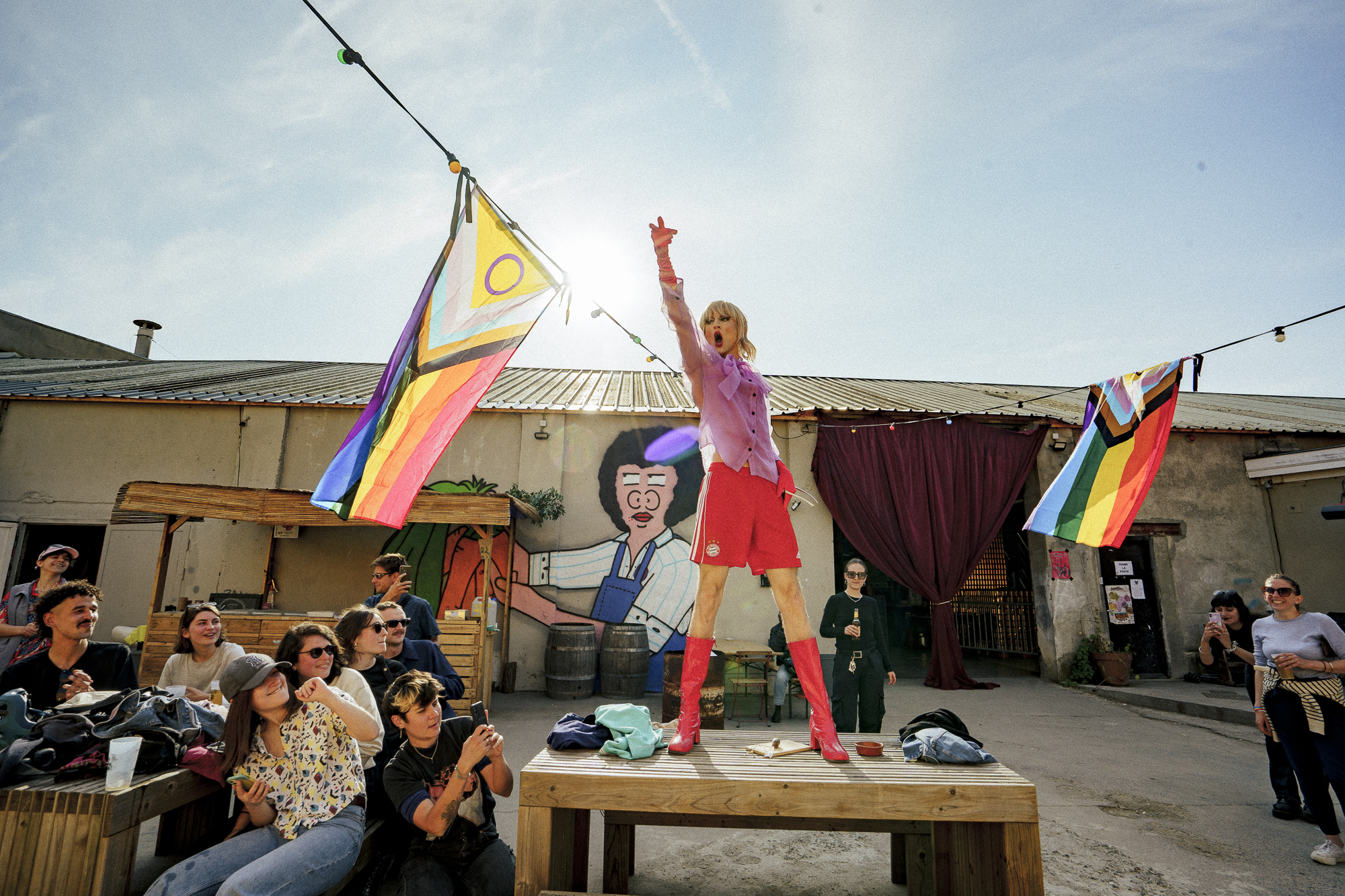
As Winston Einstein Gandhi, or whoever, said, ‘joy is an act of resistance’
‘Being drag these days, it’s like being a DJ at the beginning of the 2000s,’ André muses, in between two speculoos biscuits. The two readers belong to the new generation of drag queens and drag kings. A generation which, influenced by television, the internet and its networks, but also by movements such as Ballroom Culture, is reinventing itself. Moving away from the night scene to which it had long been confined, this generation is exploring new creative expressions and spreading political messages. ‘Drag-stream, it’s all about grandiose, showy performance, with pop music and incredible staging. For my part, I wanted to offer an educational and literary aspect, and “Unique en son genre” was the perfect project to do that,’ says Guillaume. As for André, he confides that he too wishes he’d had access to this type of reading when he was younger, to ‘see people who are totally at ease with who they are and who can show you the way.’
For both of them, drag remains first and foremost an artistic practice. ‘I don’t do drag because I feel uncomfortable in my skin, but because I believe that the stage needs spectacular creatures!’ André explains, nonchalantly. ‘I am a guy putting on cisgender shows. Sometimes drag can enable people to make their transition. It can serve that purpose too, of setting out on a journey, pushing and stretching yourself, and finally flourishing. Personally, it hasn’t changed my identity,’ affirms Guillaume, for whom drag is also a way of ‘reclaiming and celebrating femininity outside of the male heterosexual prism,’ because, ‘as Winston Einstein Gandhi, or whoever, said, “joy is an act of resistance”.’
After appearing at the Avignon Festival this summer, Vakah Profana and Sandra Van de Kamp will resume their readings in September. With a new audience in particular: elderly people. Why them? ‘In the collective imagination, they are perceived as heterosexuals and old-school. But let’s go and see them, they must have so many experiences to share!’ exclaims Vakah. Sandra, for her part, is all for performing drag shows in care homes.
A story, projects or an idea to share?
Suggest your content on kingkong.
